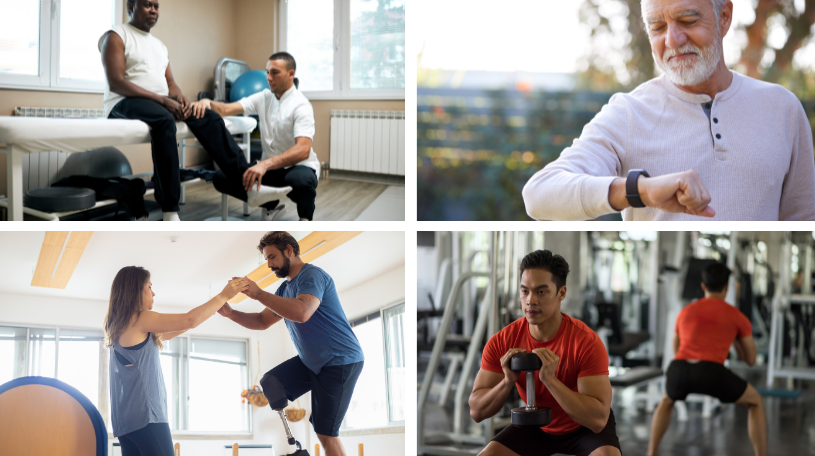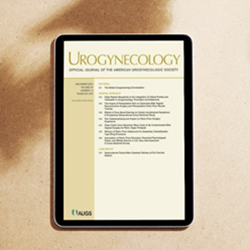Special Topics in Men's Health Virtual Pop-Up On-Demand
On-Demand Courses

Are you a men’s health clinician interested in learning about specific topics designed to enrich and broaden your practice? Do you treat other populations and want to know more about men’s health? Join us for the on-demand version of our virtual pop-up featuring presentations by experts in men's health. The event originally aired November 13-14, 2024. Designed to fit seamlessly into your busy work-life schedule, our dynamic 3-part virtual pop-up series features expert-led sessions on critical topics, including the evaluation and treatment of neurogenic testicular pain, the biopsychosocial considerations for gay and bisexual men post-prostatectomy, and the use of penile pumps and implanted prostheses.
Our sessions are led by industry leaders who bring a wealth of experience and unique perspectives to the forefront of men’s health. Engage with Ken McGee, Sarah Prestegard, and Ariel Wynne, as they provide practical insights and innovative strategies tailored to enhance your practice. This is a valuable chance to learn from experts who are passionate about advancing men’s health and empowering clinicians like you!
Your registration includes:
- 3 educational sessions (45 minutes each) featuring 3 different thought leaders
- 15-minute live Q&A session recordings with the speakers after each session
- Post-event quiz and survey to complete online in the Learning Center
- Digital badge you can add to LinkedIn or your website
- PDF Certificate of Completion with 3 Awarded Contact Hours
Contact Hours
This on-demand course is worth 3 contact hours. All who pass the quiz will receive a digital badge and a certificate of completion.
Programming
Click below on each session title to view details.
Physical therapists often undergo training in the skills they expect to support clients with inside the clinic. However, physical therapists rarely receive hands-on training on (1) the use of penile pumps and (2) supporting clients with implanted penile prostheses. With the increase in the population over 65, as well as expanding access to gender-affirming surgeries, pelvic health physical therapists are more likely to encounter both pumps and prostheses. This talk seeks to demystify these options and help physical therapists feel more confident supporting their cisgender and transgender clients.
Learning Objectives
- Participants will be able to instruct their clients in penile and external genitalia pump use.
- Participants will understand the process for clients undergoing penile prosthesis implantation.
- Participants will understand how pelvic rehabilitation might be different for clients with penile prostheses.
Meet Our Presenter
Ken McGee, PT, DPT, WCS (they/he)

Ken McGee, PT, DPT (they/he) is a white, queer, transmasculine physical therapist based on Coast Salish land (Seattle, WA). They value opportunities to teach about shared themes in cisgender and transgender men’s pelvic health, drawing upon their 10+ years of experience in pelvic health. Throughout the year, Ken instructs hands-on pelvic examination and treatment skills as a faculty member of Herman and Wallace Pelvic Rehabilitation Institute. Ken is proud to be part of the inaugural faculty for Tufts University’s Doctor of Physical Therapy program in Seattle. Outside of the clinic, Ken enjoys advocating for queer families as a birth doula and lactation educator. Ken is the proud parent of two incredibly active kiddos.
This session will introduce evaluation basics for testicular pain and initiation of treatment. Participants will participate in a brief anatomy review, and become confident in identifying red flags and common etiologies. Physical therapy evaluation and treatments will focus on neurogenic testicular pain from inguinal nerves. Demonstrations will be provided on physical assessment, hands-on treatments, and home exercise programs.
Learning Objectives
- Identify causes of testicular pain, red flags, and differentiate between organ and neurogenic pain.
- Identify nerve pathways contributing to neurogenic testicular pain, including inguinal nerves and posterior scrotal nerves.
- Complete assessment of neurogenic testicular pain.
- Become familiar with 3-4 treatment techniques to support patients experiencing testicular pain.
Meet Our Presenter
Sarah Prestegard, PT, DPT (she)
Sarah Prestegard is passionate about all things pelvic health and teaching. She received her Doctorate in Physical Therapy from Concordia University St Paul and started specialty training in pelvic health as a student. Sarah has been instrumental in expanding pelvic health at the Minneapolis VA including mentoring the growing team of 14 pelvic PTs and OTs, advocating for pelvic health services, and providing education for interdisciplinary team members. She is an instructor for myPFM, teaching assistant for Herman and Wallace and EchoGen Rehab Ultrasound Education. Sarah’s passion topics include male pelvic health, trauma informed care, and sexual health, and has had the opportunity to present on these at local and national PT conferences. She is the owner of Pelvis Matters Mentoring providing 1:1 mentoring for pelvic health providers looking to increase their confidence in clinical reasoning. Outside of pelvic health, Sarah enjoys triathlon, great food, and spending time with family and friends.
Prostate cancer treatment can dramatically impact sexual function for all patients. In the past, outcome measures focused exclusively on erectile function and heteronormative views of optimal sexual function. While gay and bisexual men were likely included in this research, demographic questions failed to separate them out from their heterosexual peers and obscured the concerns unique to the community of men who have sex with men. This is referred to as “Invisible Diversity.” More recent research has worked to define the differences and similarities between these groups and place these concerns within the psychosocial context of gay and bisexual men. Join us as we review the updated research which highlights the biopsychosocial concerns of gay and bisexual men post-prostatectomy.
Learning Objectives
- Participants will be able to identify differences in sexual function outcomes between homosexual and heterosexual patients post-prostatectomy.
- Participants will understand common side effects of prostate cancer treatment and their impact on penetrative and receptive sexual function.
- Participants will understand role of pelvic floor PT in optimizing penetrative and receptive sex.
- Participants will understand psychosocial considerations of cancer treatment and sexual side effects in the LGBTQ+ community.
Meet Our Presenter

Ariel Wynne PT, DPT, Board-Certified Women's Health Clinical Specialist
Ariel is a pelvic floor PT and owner of Ground Floor PT. After graduating in 2018, she immediately started pursuing pelvic PT continuing education. Ground Floor PT is a specialty Pelvic Floor PT clinic with an emphasis on inclusive, gender-neutral pelvic health education and treatment.




